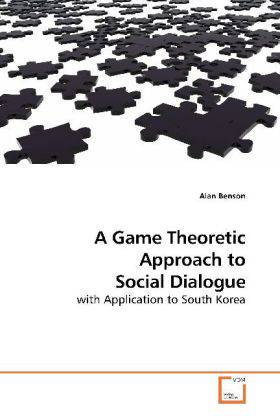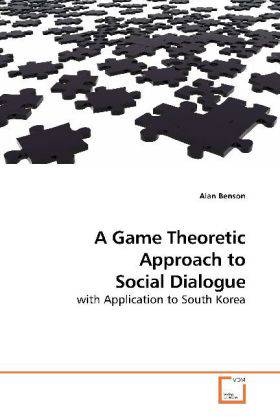
- Afhalen na 1 uur in een winkel met voorraad
- Gratis thuislevering in België vanaf € 30
- Ruim aanbod met 7 miljoen producten
- Afhalen na 1 uur in een winkel met voorraad
- Gratis thuislevering in België vanaf € 30
- Ruim aanbod met 7 miljoen producten
Zoeken
A Game Theoretic Approach to Social Dialogue
with Application to South Korea
Alan Benson
Paperback | Engels
€ 48,45
+ 96 punten
Omschrijving
This work contextualizes the ILO-recognized enabling conditions for successful social dialogue in non-cooperative game theory, potentially allowing formal model analysis to complement the field''s traditional reliance on case studies. It relates the theoretical dilemma of sustaining macroeconomic coordination to the iterated prisoner''s dilemma, and notes that the ILO''s enabling conditions for social dialogue are similar to those for sustained cooperation in iterated games, namely those given by the Folk Theorem and reputation. Most importantly, the Theorem provides a basis for dialogue''s enabling conditions to be treated holistically, quantitatively, and with clear assumptions open to scrutiny. As a result, it may formalize conceptual analysis of troubleshooting defective dialogue regimes by rationalizing the value of stabilizing partners, institutionalizing dialogue fora, embedding retaliation for defection, and accelerating communication, monitoring, and compliance. The case of tripartism in the Republic of Korea is presented in context of the model.
Specificaties
Betrokkenen
- Auteur(s):
- Uitgeverij:
Inhoud
- Aantal bladzijden:
- 56
- Taal:
- Engels
Eigenschappen
- Productcode (EAN):
- 9783639085860
- Uitvoering:
- Paperback
- Afmetingen:
- 150 mm x 220 mm
- Gewicht:
- 91 g

Alleen bij Standaard Boekhandel
+ 96 punten op je klantenkaart van Standaard Boekhandel
Beoordelingen
We publiceren alleen reviews die voldoen aan de voorwaarden voor reviews. Bekijk onze voorwaarden voor reviews.








